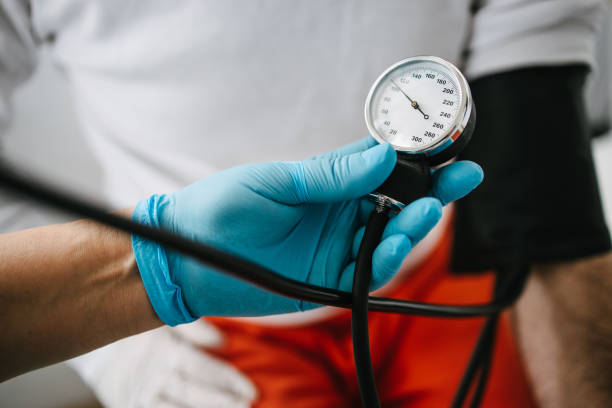What is low blood pressure?
Hypotension, or low blood pressure, is when your blood pressure’s much lower than expected. It can happen either as a condition on its own or as a symptom of a wide range of conditions. It may not cause symptoms, but when it does, it can require medical attention.
Hypotension has two definitions:
Absolute hypotension: Your resting blood pressure is below 90/60 millimeters of mercury (mm Hg).
Orthostatic hypotension: Your blood pressure remains low for longer than three minutes of you standing up from a sitting position. (It’s normal for your blood pressure to drop briefly when you change positions, but not for that long.) The drop must be 20 millimeters of mercury or more for your systolic (top) pressure and 10 millimeters of mercury or more for your diastolic (bottom) pressure. Another name for this is postural hypotension because it happens with changes in posture.
Measuring blood pressure involves two numbers in millimeters of mercury.
Systolic (top number): This is the pressure on your arteries each time your heart beats.
Diastolic (bottom number): This is how much pressure your arteries are under between heartbeats.
How does low blood pressure affect my body?
Usually, your body can automatically control your blood pressure and keep it from dropping too much. If it starts to drop, your body tries to make up for that, either by speeding up your heart rate or constricting blood vessels to make them narrower. Symptoms of hypotension happen when your body can’t offset the drop in blood pressure.
For many people, hypotension doesn’t cause any symptoms. Many people don’t even know their blood pressure is low unless they measure their blood pressure.
For people with symptoms, the effects depend on why hypotension is happening, how fast it develops and what caused it. Slow decreases in blood pressure happen normally, so hypotension becomes more common as people get older. Fast decreases in blood pressure can mean certain parts of your body aren’t getting enough blood flow. That can have effects that are unpleasant, disruptive or even dangerous.
What causes high blood pressure?
High blood pressure usually develops over time. It can happen because of unhealthy lifestyle choices, such as not getting enough regular physical activity. Certain health conditions, such as diabetes and having obesity, can also increase the risk for developing high blood pressure.
Who does low blood pressure affect?
Hypotension can affect people of any age and background, depending on why it happens. However, it’s more likely to cause symptoms in people over 50 (especially orthostatic hypotension). It can also happen (with no symptoms) to people who are very physically active, which is more common in younger people.
How common is low blood pressure?
Because low blood pressure is common without any symptoms, it’s impossible to know how many people it really affects overall. However, orthostatic hypotension seems to be more and more common as you get older. An estimated 5% of people have it at age 50, while that figure climbs to more than 30% in people over 70.
High Blood Pressure
High blood pressure (hypertension) can be dangerous if it’s not treated. It can put you at risk for stroke, heart failure, kidney failure and other medical problems.
SYMPTOMS AND CAUSES
What are the symptoms of low blood pressure?
The most common low blood pressure symptoms happen because your brain isn’t getting enough blood flow. These include:
- Dizziness or feeling lightheaded.
- Fainting or passing out (syncope).
- Nausea or vomiting.
- Blurred or distorted vision.
- Fast, shallow breathing.
- Fatigue or weakness.
- Feeling tired, sluggish or lethargic.
- Confusion or trouble concentrating.
What causes low blood pressure?
Hypotension can happen for a wide range of reasons. Causes of low blood pressure include:
Orthostatic hypotension: This happens when you stand up too quickly and your body can’t compensate with more blood flow to your brain.
Central nervous system diseases: Conditions like Parkinson disease can affect how your nervous system controls your blood pressure. People who have hypotension because of these conditions may feel the effects of low blood pressure after eating because their digestive system uses more blood as it works to digest food.
Low blood volume: Blood loss from severe injuries can cause low blood pressure. Dehydration can also contribute to low blood volume.
Life-threatening conditions: These conditions include irregular heart rhythms (arrhythmias), pulmonary embolism, heart attacks and collapsed lung. Life-threatening allergic reactions (anaphylaxis) or immune reactions to severe infections (sepsis) can also cause hypotension.
Heart and lung conditions: You can get hypotension when your heart beats too fast or too slow, or if your lungs aren’t working as they should. Advanced heart failure (weak heart muscle) is another cause.
Prescription medications: Hypotension can happen with medications that treat blood pressure, heart failure, erectile dysfunction, neurological problems, depression and more. Don’t stop taking any prescribed medicine unless your provider tells you to stop.
Alcohol or recreational drugs: Recreational drugs can lower your blood pressure, as can alcohol (alcohol’s effect only lasts a short time, and long-term overuse of alcohol can cause high blood pressure). Though not technically medications, certain herbal supplements, vitamins or home remedies can also lower your blood pressure. This is why you should always include these when you tell your healthcare provider what medications you’re taking.
Pregnancy: Orthostatic hypotension is possible in the first and second trimesters of pregnancy. Bleeding or other complications of pregnancy can also cause low blood pressure.
Extreme temperatures: Being too hot or too cold can affect hypotension and make its effects worse.







